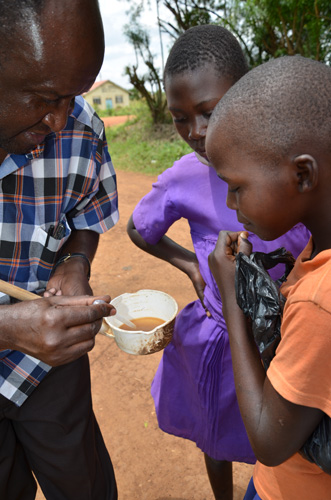
PMI supported IRS through AIRS in Liberia from 2009 to 2013, but due to widespread pyrethroid resistance and increased costs of new insecticides, the decision was made to suspend support for indoor residual spraying (IRS) in Liberia. Since that time, PMI has increased support for entomological surveillance, including vector bionomics and insecticide resistance monitoring, and concentrated on improving universal insecticide-treated net (ITN) coverage.
In Liberia, the PMI VectorLink Project works closely with the Ministry of Health (MOH), National Malaria Control Program (NMCP), and health research institutions for vector monitoring and insecticide resistance surveillance. From 2015 to present, relevant data was collected in different counties in Liberia which were used to guide decision-making on malaria preventive interventions. In 2019, Liberia Ministry of Health approved the use of registered Interceptor® G2 (IG2) nets for the mass net distribution in 2021. The decision was made based on the field data collected by PMI VectorLink and NMCP on malaria mosquito resistance status to pyrethroids and susceptibility to chlorfenapyr in various counties. In June – August 2021, the IG2 net was distributed throughout Liberia during a mass campaign despite logistic and road conditions challenges.
In year one (2017–2018), vector bionomics monitoring was conducted in three sites – Frank Town (Montserrado County), a peri-urban area; Tomato Camp (Bong County), a rural highland area; and Jeneta (Margibi County), a rural zone. In year two (2018–2019), these three sites were replaced with four new sites, which were selected in collaboration with NMCP, and included Medina (Grand Cape Mount County), Fissebu (Lofa County), Koryah (Bong County) and Saint John (Grand Bassa County). In year three (2019–2020), the number of sites was increased to eight, including Medina (Grand Cape Mount County), Fissebu (Lofa County), Koryah (Bong County), Saint John (Grand Bassa County), Zeanzue (Bong County), Gbedin (Nimba County), Suehn (Bomi County), Jackson Farm (Margibi County). Collections were suspended in March 2020 due the COVID-19 pandemic and resumed in August 2020. In year four (2020-2021), the team was able to perform field collections in the eight sites listed above without any interruption. Gbedin (Nimba County) and Suehn Town (Bomi County) had high vector densities of An. gambiae s.l., whereas An. funestus s.l. was more predominant in Zeanzue, Koryah and Fessibu.
In year five (October 2021 – September 2022), PMI VectorLink Liberia, in collaboration with NMCP/MOH, Liberian Institute of Biomedical Research (LIBR), University of Liberia (UL), as well as county and district staff, implemented routine monthly vector bionomics monitoring, and insecticide resistance surveillance in Liberia. The project’s primary objective was to generate data on malaria vector bionomics and insecticide resistance that can be used by the NMCP to make evidence-based strategies on malaria vector control interventions in Liberia.
Insectary and Laboratory Activities
- Managed the established insectary, maintained the mosquito colony, and ensured that all activities in the insectary followed standard protocols.
- Built the NPHIL/LIBR staff capacity in laboratory analyses of mosquito samples through virtual training and mentoring.
- Enabled in-country molecular analyses of entomological samples at LIBR to include analyses for mosquito species identification, Plasmodium falciparum sporozoite rate.
Field Activities
- Conducted insecticide susceptibility monitoring in ten sites across eight counties, prioritizing those insecticides that are used to treat ITNs. This included pyrethroids (deltamethrin, permethrin, alpha-cypermethrin) with and without pre-exposure to the synergist piperonyl butoxide (PBO) and chlorfenapyr.
- Conducted monthly vector bionomics monitoring in eight routine sites. These sites were selected to monitor the spatial and temporal distributions and densities of Anopheles vector species and characterize their biting and resting behavior.
- Provided practical training to local staff in routine entomological monitoring sites in the field and at the insectary.
ITN Activities
- Conducted Interceptor® G2 ITN streamlined durability monitoring.
- Continued with the post-distribution data collection for the entomological and epidemiological monitoring of Interceptor® G2 ITNs, including collection of entomological and insecticide resistance data in four sites.
National-Level Support
- Trained and supervised the NMCP technicians and UL staff in entomological techniques and provide on-the-job training and coaching of these staff at sentinel sites.
- Supported development of NMCP, UL, LIBR and county staff skills on data management and analysis, managing the insectaries and entomological monitoring.
- Supported the ITN streamlined durability monitoring activities planning and implementation in coordination with NMCP.

